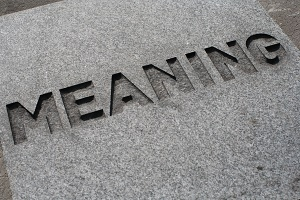ATD Blog
Find Meaning in the Moment
Mon Apr 06 2015

Stories revolve around moments: big moments, small moments, meaningful moments.
Think about your life over the last six months. Did any challenges or obstacles cross your path? Were there things that didn’t go according to plan: big things, little things, important things?
Garrison Keillor says that your "best stories are about mistakes, failures, and small disasters." In the context of my Nine Steps of Story Structure, I call these "obstacles." They can be big obstacles like life-threatening illnesses or a tragic event, or small obstacles such as a misunderstanding or a two-hour traffic jam.
The mistake, failure, or small disaster is the obstacle that gives your story tension and infuses it with emotion. Think of the “moment” that you encounter the obstacle as the pivot point of your story. This moment causes you to make choices about what to do next. I referred to this as the “Iceberg Moment.” In the story of the Titanic, everything was going along fine until the ship encountered the iceberg.
Power of Everyday Moments
The moments that make for a great story don’t always have to be profound or dramatic. Most of the stories I work on with my learners are about everyday events and situations. They’re about things that happen at home, at work, and everywhere in between.
Indeed, the power of story lies not in the event, but in finding the meaning in the moment. More often than not, the lesson of the story turns out to be a metaphor. You don’t need an interaction between a leader and an employee to have a lesson on good leadership. The story could be about hiking, sailing, or walking your dog—as long as there is a metaphorical lesson that comes out of what happened and what you did about it.
For example, as I was standing in line to purchase something, the person in front of me paid for his items and left the store. As I was checking out, the man returned to the store, walked up to the clerk, and said, “You gave me too much change.” Then, he handed over a dollar bill. The clerk who had made the mistake was dumbfounded. The guy standing in line behind me said, “At least someone is still honest.”
It was a nice moment. What meaning can you find in this moment? How could you use that story in a training presentation? What lesson can others learn?
My Moment
I can vividly remember a moment in my life, from more than 30 years ago. I was in rehearsal for the Shakespeare play, All’s Well That Ends Well. I had a good role; I was 33 years old and had been acting for 14 years but had not made much headway in Hollywood. In other words, I was a typical young struggling actor.
No one in the cast was being paid in this particular production. As I looked across the stage, my eyes settled on a couple of men in their late 50s who had small roles as dukes and magistrates. In that moment, I made a decision never to be a 50-year-old actor working for free. I was already tired of the struggle of living hand-to-mouth, and I didn't want to be doing that for another 25 years. I wanted to be successful at something, and it didn’t seem like acting was going to do it.
That was a turning point moment in my life. From that moment forward, my life took on a new direction. A year later, I left Hollywood, relocated to Colorado Springs and became a realtor. During 11 years in real estate, I became successful, bought my first house, met my future wife, and discovered the profession of speaking.
All’s Well That Ends Well, Indeed!
Turning-point moments happen to us all the time. It’s not the moment that counts, however. It’s your ability to find the meaning in the moment. Stories are teaching tools. When told with elegance and craft, they bring meaning to life. They help people see new possibilities and alternative choices.
Stories have the ability to make sense of the seemingly random obstacles, pernicious pitfalls, and happy coincidences that insert themselves into our daily lives and careers. They teach us how to live.
In the end, all stories are about change of some sort: change that is forced upon us by outer circumstances, such as car accidents, health challenges, and hurricanes. Or, they can be changes that takes place within us, such as the decisions we make about how we want to live our lives. Our lives pivot at moments of change and choice. As storytellers, we have to find the meaning in these moments—if we are to serve our audiences, employees, and stakeholders.
Consider the moments of change and choice you have faced in the last six months. Were they challenging, painful, or just plain frustrating? Regardless of how big or small the moment is, your job is to find meaning and share it with others.

Want to learn more about the most essential topics in learning and development and learning technologies? Check out the Core 4 Conference in Austin, TX this September.
You've Reached ATD Member-only Content
Become an ATD member to continue
Already a member?Sign In
